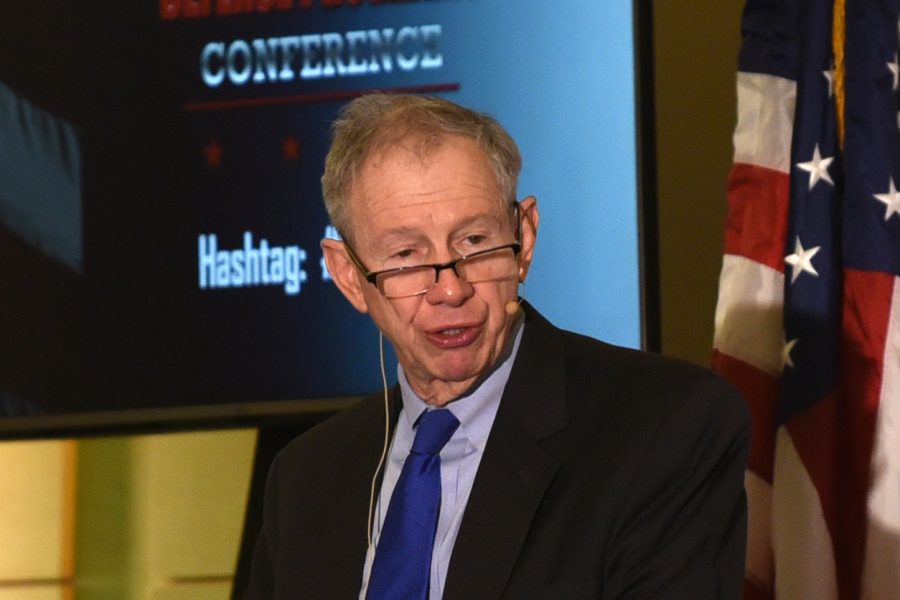The U.S. can’t wish away great power competition with Russia and China, and it needs to get serious in structuring for it over the long-term, the Pentagon’s top technologist, Undersecretary of Defense for Research and Engineering Mike Griffin, said March 4.
Space defense, for example, despite boasting a new service and new thinking, is still oriented toward outmoded ideas, he said, and the threat from China’s hypersonic weapons is particularly tough to counter.
Referring to the U.S. “winning” the Cold War in the early 1990s, Griffin told a crowd of defense experts at a McAleese and Associates conference in Washington that “the trouble with winning is, you think you’re done, and you can relax. But that just means the losers re-group and try again.” Since then, there’s been inadequate U.S. research in the technologies that will provide an advantage in the 21st century, Griffin said.
Preoccupation with wars in the Middle East that were “important, but not existential” threats to the U.S., led to too little being spent on leap-ahead and stay-ahead technologies, Griffin asserted. As a result, Russia and China took advantage of the opportunity to steal a march on the U.S. Those countries, and others on the rise, “don’t respect Western values,” Griffin asserted, and are definitely challenging the U.S. and its ideology.
“Western liberal democracy, Western thought, is under attack,” he said, and U.S. adversaries do not share values such as “the rule of law, property rights of individuals, the right to freedom of movement, the right to free markets, and many other things.”
Like it or not, “We need to accept that we are once again in Great Power Competition,” and invest accordingly, Griffin said. He added that it won’t be easy convincing the nation the situation has changed, but “I believe we will step up. That’s why I took this job.”
To deal with the new threat, the U.S. has to rethink its space architecture, Griffin noted.
“We have the architecture I would design if we didn’t have a threat. But in case anyone hadn’t noticed, we have adversaries and we have a threat to our architecture, and so we need, above all else, to be far more resilient, because space is absolutely critical to everything about the way the United States fights wars,” he said. America’s space architecture still consists “of a relatively few very high value, extraordinarily exquisite, unbelievably capable space assets. For which the other name is, targets to the adversary.
“We cannot give the adversaries even the faintest idea that they could disable our space architecture. So we need proliferation,” and not just in low-earth orbit, which Griffin said he’s been known to champion. “I want to proliferate in all orbits, with assets that are individually lower-value but collectively very high value, so that they don’t give the adversary a …desirable aimpoint.”
The threat from China’s hypersonic weapons is “real and increasing,” Griffin reported.
“They outrun and out-range our best radars. We have to be prepared to deal with raids of not one and two, but many.” Though, he said, “We can do that. … You have to be able to see them coming. You will not hit a target that you cannot see.” Until the U.S. can spot and track “dim upper stages without being dependent on exquisite radar assets, we will be concerned.” Chinese hypersonic weapons are “20 times dimmer, or more, than the targets we are able to track” with the Space-Based Infrared System, or SBIRS.
Adding more “exquisite” radars in the region is either not an option or would only create more targets for an adversary, so the U.S. “can only do the target acquisition and fire control problem from space,” Griffin said. ” … We need to be closer to the action, or we need very large optics, which, again, creates more high-value targets.”
Griffin said allies will play a big role in technology development.
“To defend those values requires not just the United States as the Lone Ranger, with maybe some sidekicks, but really, full and open partnerships, and we are working with allies on many of these technology areas.” Most, he said, he cannot discuss, but “it is incredibly valuable. … We wouldn’t succeed without our allies and partners.”
